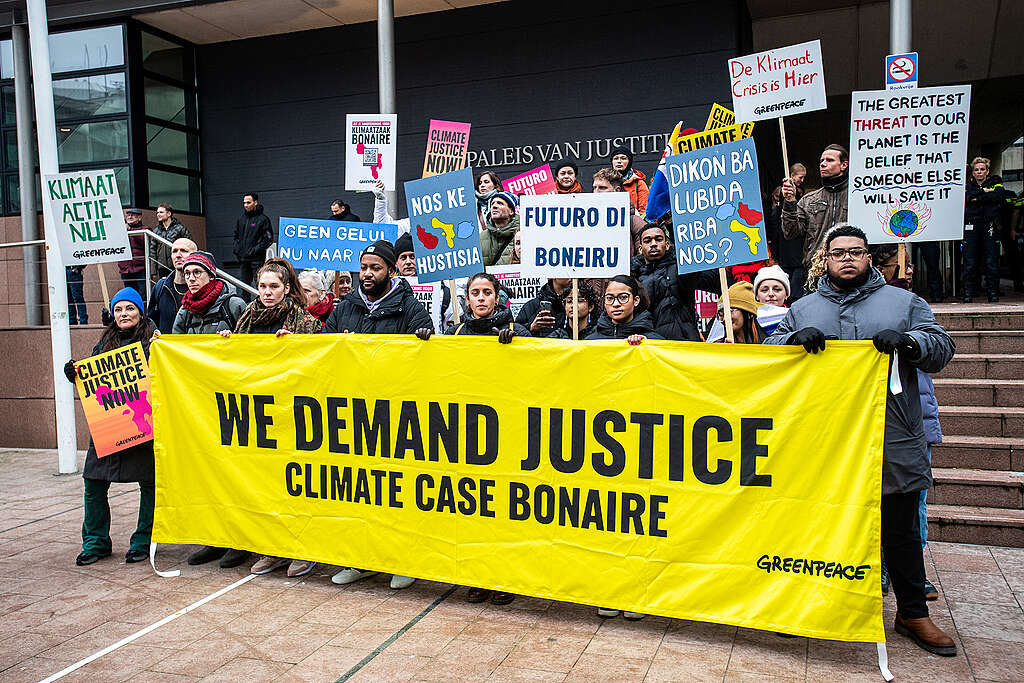
Bonaire climate case: islanders demand protection from consequences of climate crisis.
The Hague, Kralendijk, January 11, 2024 – Eight residents [1] of the Dutch-Caribbean island Bonaire, together with Greenpeace Netherlands, filed a lawsuit against the Dutch State today. Bonaire, a former Dutch colony, has been a special Dutch municipality since 2010. The plaintiffs claim the Dutch government is violating their human rights by not taking sufficient measures to protect the inhabitants of the low-lying island of Bonaire from the effects of the climate crisis. This is stated in the summons delivered today to the District Court in The Hague. On Bonaire, several of the plaintiffs and Greenpeace Netherlands announced the news during a press conference in Kralendijk.
Climate justice
The plaintiffs point out that the residents of Bonaire have witnessed for a long time that the Dutch State has not taken any measures to ensure their island is safe and remains habitable in the future. Despite several talks between the plaintiffs and the government in recent months, this did not lead to sufficient commitments from the government. Danique Martis (25), a social worker and one of the plaintiffs said: “The Caribbean Netherlands has been forgotten for too long. There are plans in place to protect the European Netherlands against sea-level rise and other consequences of the climate crisis, but for Bonaire this is not yet the case. It saddens me to see how, despite knowing their responsibility, the Dutch government has chosen to push our right to safety aside. For this reason, we are going to the court, so they have no choice but to act. ”
Summons
The summons [2] contains two demands:
1. The Dutch government must make plans and take concrete measures, developed together with inhabitants, to protect Bonaire from the consequences of climate change.
2. The Netherlands must do their fair share to keep global warming below 1.5°C degrees celsius and therefore reduce carbon emissions faster. Ten years earlier than in current plans. The Netherlands must reach zero greenhouse gas emissions by 2040 at the latest.
The Dutch government must take measures to protect the islanders’ human rights, specifically their right to life and to respect private and family life. So that Bonairians can continue to live on the island and pass on their traditions and culture to their children. Judmar Emerenciana (25), a graphic designer who is also a plaintiff in the case said: “We are at risk of losing our culture. I don’t want the slave huts to end up underwater, with us thinking in the future, ‘We could have prevented this’.”
Protest march in The Hague
Several dozen people, including representatives of the Caribbean diaspora and the climate movement, are holding a symbolic protest march in The Hague today. They walk from the Prime Minister’s office to the District Court, where the summons is delivered. There will be speeches along the way. The demonstrators carry protest signs and a banner reading ‘We demand justice – Climate Case Bonaire’.
Plaintiff Kjelld Kroon (28), who works as a program creator said: “Climate change is happening right now on Bonaire. It’s getting increasingly hot and the rain showers are more frequent and more extreme. These downpours are causing flooding, inundating many houses. Including my mother’s house. The time for talking is over, we have to act. I don’t want to have to wait any longer and that’s why I’m taking action today.”
Kralendijk press conference
At a press conference in Kralendijk, the capital of Bonaire, several of the plaintiffs have joined Greenpeace Netherlands to announce the news. Andy Palmen, executive director of Greenpeace Netherlands said: “It shouldn’t matter whether you live on Bonaire, on Ameland or in Valkenburg. It’s the Dutch government’s duty to protect all of us from the consequences of the climate crisis. Bonaire is being hit hard by rising sea levels, heat waves and the deterioration of its coral reefs. The government has a duty to reduce global warming as much as possible, and right now it’s failing to do so. We demand more protective measures for Bonaire, and we want the Dutch government to speed up the reduction of carbon emissions from the whole of the Netherlands. This is in the interest of all of us.”
Research by VU Amsterdam
A study by the Vrije Universiteit (VU) Amsterdam commissioned by Greenpeace [3] has shown that the effects of climate change are already affecting daily life on Bonaire. The island’s inhabitants are facing serious risks due to rising sea levels, increased heat and coral degradation. If global carbon emissions are not significantly lowered, a fifth of Bonaire could be lost to the sea by the end of this century.
Municipality of the Netherlands
Bonaire is located almost 8,000 kilometres from the capital of the Netherlands. The Netherlands has been present on the Caribbean island for almost four hundred years. Since the dissolvement of the country of the Netherlands Antilles in 2010, Bonaire has been a special municipality of the Netherlands.
————————————————————————————————————————–
Footnotes
[1] Plaintiffs Onnie Emerenciana, Jackie Bernabela, Angelo Vrolijk, Danique Martis, Judmar Emerenciana, Helen Angela, Kjelld Kroon and Daniela Simal.
[2] To read the summons in full, click HERE
[3] Research by the Vrije Universiteit Amsterdam; The impact of climate change on Bonaire: an analysis of different scenarios and their impact on the Dutch Caribbean municipality.
